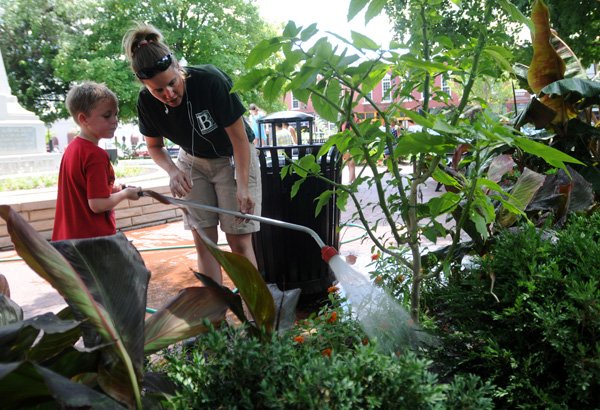BENTONVILLE — As summer heat settles like a blanket over Northwest Arkansas, several cities are amping up their watering regimes to keep parks blooming and ball fields green.
These summer oases don't come without a cost, however. Fayetteville spent about an extra $10,000 last year over what city staff anticipated in the 2012 budget. Most cities wrap watering costs in an overall utility budget and can move money around to meet watering needs.
Northwest Arkansas spent last summer in a severe and persistent drought, according to the National Weather Service. Irrigation systems in Bentonville, Fayetteville and Rogers worked overtime to keep soil moist overnight and bring hot daytime temperatures down for plants.
A wet spring this year rife with flooding around the state puts cities in a better position going into the hottest part of the summer.
“We were really good through June,” said Byron Humphry, maintenance superintendent for Fayetteville. “Compared to last year, we had two more months of rain before the summer hit. We were watering pretty heavily by last May.”
Bentonville is slightly more than an inch below normal rainfall for the year, while June was the sixth driest June in Fayetteville since 1950. Northwest Arkansas was considered abnormally dry as of July 11 by the National Weather Service but not yet in a drought.
“It’s a double-edged sword,” said David Wright, director of Bentonville’s Parks and Recreation Department. “In the spring we were talking about floods. Now we’re talking about a drought. I’m not begging for rain yet. We need a rain, but we say that every July.”
Bentonville, Rogers and Fayetteville use timed irrigation systems to keep parks and ball fields watered and do minimal hand or truck watering in horticulture beds and curbside trees. Springdale doesn't do any irrigation in parks but uses an automatic system in sports fields.
Overall cost keeps Springdale’s summertime investment minimal.
At A Glance
Lawn Tips
Looking to keep your own lawns and plant beds looking fresh this summer? Follow these tips from the University of Nebraska at Lincoln:
• Water about half an inch deeper than the deepest roots to encourage downward growth.
• Water in the early morning from 4 a.m. to 10 a.m.
• Change the time that your system runs each month, or at least seasonally.
• Adjust sprinkler heads as plants grow larger and block spray pattern.
• If temperature is above 90 degrees, run sprinklers five to 10 minutes in the afternoon to cool plants.
• Create water zones by putting plants together that have similar water needs.
“We just use what we get from the sun,” said Chad Wolf, operations manager for Springdale Parks. “There’s not enough money to do it all summer.”
Problems with fixing irrigation heads broken during mowing present another challenge, he said.
Other cities have had to make decisions to ration water during dry conditions. An extreme example is enforced water conservation in Rogers a few years ago, said Stan Weaver, parks superintendent. The city wasn't able to keep parks green and opted to let “nature take its course” with the hope the plants would rebound the following spring, Weaver said.
Fayetteville prioritized water for some of its parks during last year’s severe drought.
“Last year we had to let some areas go to ration water,” Humphry said. “Last year it was the baseball fields. We didn’t let the grass die but backed off and let it go dormant.”
The Parks Department put focus instead on ball fields that were still in use. With the baseball season over, the city irrigated soccer and softball fields.
Bentonville makes some of those rationing decisions on the front end of park development, said Wright. Installing irrigation systems is a construction decision, and some areas go without water.
“If you look at the North Bentonville Trail, there are acres and acres of unirrigated property,” Wright said. “We decided it can burn up in the summer.”
Those decisions are a balance between irrigation costs and protecting the city’s investment into the park or field, Wright said.
“We know it costs taxpayers money with irrigating,” he said. “But all those plants also cost money to grow and install. Plus, there is a definite return on the experience.”
Bentonville and Fayetteville both grow their plants in city greenhouses. Other cities purchase flowers and other plants from merchants.
Arkansas’ hot, dry summers also play a role in the type of plants selected. Bermuda grass is popular because of its propensity to thrive in the heat. Weaver said fields of Bermuda grass will stay green as long as his department maintains irrigation and prevents soil compaction.
The cities prioritize irrigation at high-traffic areas such the Bentonville and Fayetteville squares and soccer fields. Areas like this are targets for additional watering when needed to keep them safe for players and enjoyable for pedestrians.
Workers were hand watering around the Bentonville square last week after the irrigation system had to be turned off because of a leak. A spray of water fell on the beds around the square as parks staff and city horticulturist Meagan Lipscomb scrambled to keep blades of grass and elephant ears from wilting.
“It’s a fine balance of how to do this and keep things as green as healthy as we can, especially in high impact areas,” Wright said.

